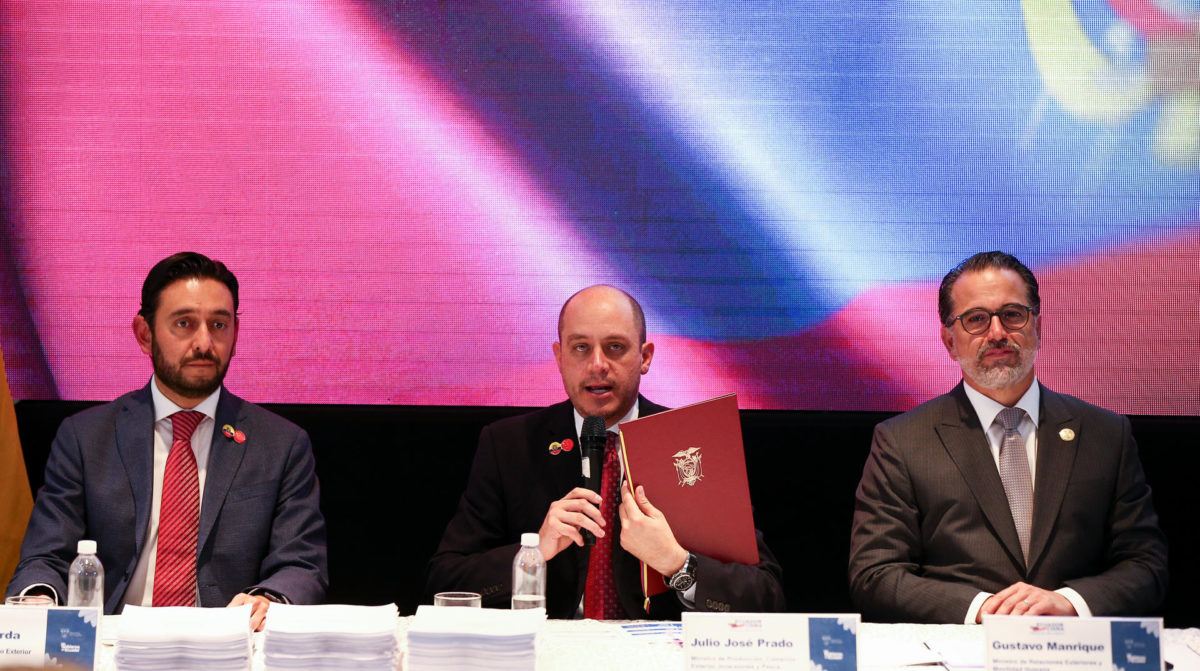The National Assembly from Ecuador ratified this Wednesday the trade agreement signed last May with Chinaso it will become the fourth country in Latin America to launch a free trade agreement with the Asian giant after Chile, Peru and Costa Rica.
The agreement was ratified by the full Assembly with 76 votes in favor23 against and 35 abstentions, after a tense session in the chamber that lasted for three hours in which parliamentarians intervened both for and against.
In the days before The business associations had emphasized the multitude of opportunities that would open up for Ecuador by applying this treaty.while indigenous groups, environmentalists and ecologists showed their fears that it will open the door to the entry of toxic waste and Chinese fishing fleets into Ecuadorian waters.
The session of the Assembly to discuss this issue resumed this Wednesday after almost a month suspended to dialogue with the different groups and demystify the possible damages that the free trade agreement with China could generate, said the president of the Chamber, the Christian Socialist. Henry Kronfle.
“This is not a political issue, it is not a partisan issue, it is an eminently technical issue”he added.
The free trade agreement was signed in May 2023 under the presidential mandate of the previous president, Guillermo Lasso (2021-2023), but his successor, the businessman Daniel Noboasupported its ratification supported by other groups in the legislative chamber.

Rising business relationship
This agreement will boost Ecuador’s relations with China, which since 2022 has become its first trading partner by overtaking the United States as the first destination for non-oil exportsespecially shrimp (prawn) and lead and copper concentrate.
The trade exchange between both countries in 2022 reached 12,295 million dollars. While Ecuadorian exports to China reached 5,843 million dollars in 2022, Chinese sales to Ecuador amounted to 6,452 million dollars.
So, The treaty will allow 50% of Ecuador’s exportable supply to be immediately released from tariffs for entry into China.which will reach 99.6% within ten years, since there will be gradual reductions in other products.
The Minister of Production, Foreign Trade, Investment and Fisheries, Sonsoles García, assured that this treaty represents a great opportunity for the different productive sectors, particularly micro, small and medium-sized enterprises (MSMEs), as well as the popular and solidarity economy. .
García highlighted that the agreement allows Ecuadorian companies to reach a market of 1,400 million people with greater ease, which will increase income from exports to at least 8,000 million and will allow access to 50,000 new jobs for Ecuadorians in the next 5 years.
Conflicting opinions
On the eve of the debate, the Ecuadorian Business Committee, which brings together the chambers of several productive fronts in the country, urged the Assembly to ratify the agreement, considering unfounded the fears of environmentalists and indigenous people, who affirm that the treaty would import goods “garbage” and that there would be risks of “pollution” in the country.
These “are understandable fears” but they are “far from what was negotiated in the agreement and from the current regulatory framework that exists in the country,” stressed the Business Committee that participated as a guest in the FTA negotiations with China.
“Ecuador maintains its sovereign power to prohibit and control the entry of products that put the population at risk or that contaminate our environment,” he added in the letter and added: “A trade agreement does not restrict the right to prevent the entry of goods.” pollutants.
For opposition groups, the agreement now ratified will exacerbate the multiple crises of environmental and collective rights experienced by the people of the Ecuadorian Amazon and would introduce new sources of pollution and environmental and social conflicts.
They also believe that it will harm Ecuador’s food sovereignty and promote deforestation with the introduction without paying tariffs of transgenic seeds and the “over-export” of food to China, which they fear will enhance the loss of biodiversity and the contamination and degradation of soils due to the use of fertilizers. EFE

#National #Assembly #ratifies #trade #agreement #China

